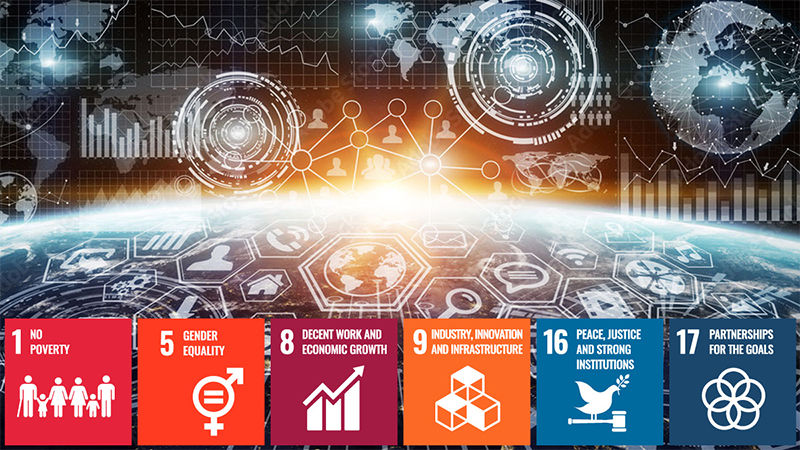Digital technologies and their application in international trade practices have the potential to greatly contribute to the achievement of Sustainable Development Goals. For Small Island Developing States (SIDS), ICT and e-commerce have immense potential for supporting the participation of SIDS in international and regional markets, building resilience and recovering better from disasters.
Despite its importance, digital economy in SIDS is still in its early stage of development. The common challenges in the digital transformation of SIDS include not only the access to affordable digital infrastructure, but also the lack of adequate legal frameworks and digital identity system which can facilitate the take-up of e-commerce and the transition to a digital economy. Furthermore, the lack of official national statistics on ICT use and e-commerce constitutes a handicap for the formulation and evaluation of digital development policies. COVID-19 pandemic has reinforced pre-existing bottlenecks in the e-commerce ecosystem of SIDS.
Objective of the Project
This project will strengthen the capacities of Small Island Developing States in Africa, the Caribbean and Asia and the Pacific to adopt trade policies that foster digital economy development and enhance crisis responsiveness. It will develop the skills and knowledge with innovative approaches based on a recognized blended learning method and state-of-the-art technological solutions.
The project is structured in three different components:
- Legal aspects of e-commerce
- Digital economy statistics
- Digital identity for trade and development
Activities
The activities of the project include:
- Conduct a needs assessment (baseline, questionnaire on legal aspect, ecommerce, statistics). Contact with local authorities, UN Resident Coordinator system, etc.
- Produce a needs assessment report
- Produce, update and deliver the online course on Digital Identity for Trade and Development
- Produce, update and deliver the online course on Legal Aspects of e-Commerce
- Produce and deliver the online course on Digital Economy Statistics 2023
- Organise interactive e-workshops for each of the three components
- Produce specific policy recommendations validated by e-workshop participants
- Draft policy proposals presented to national authorities
- Organise a high-level hybrid conference for policy makers and decision makers. It will bring together selected participants and relevant stakeholders from target countries.
Intended Outcomes
- 3 digital course packages updated and adapted to SIDS
- Representatives from 20 out of 38 SIDS completed each of the 3 e-learning courses
- 3 x 3 specific policy recommendations validated by e-workshop participants
- 3 x 2 case studies presented to broader audiences
- 3 x 2 policy proposals drafted and presented to national authorities
Link to the SDGs
Considering the potential of the digital economy to contribute to all SDGs and the focus of the project on capacity building of SIDS, the project will directly help achieve SDGs 8, 9, 16 and 17.
Goal 8 (Promote sustained, inclusive and sustainable economic growth, full and productive employment and decent work for all), in particular targets 8.3 promoting productive activities, entrepreneurship, creativity and innovation, and 8.a Increased Aid for Trade.
Goal 9 (Build resilient infrastructure, promote inclusive and sustainable industrialization and foster innovation) in particular targets 9.3 integrating enterprises into value chains and markets, 9.a infrastructure investment through finance, technological and technical support to SIDS, LLDCs and LDCs, and 9.c access to ICT.
Goal 16 (Promote just, peaceful, and inclusive societies), in particular targets 16.6 developing effective, accountable and transparent institutions at all levels, and 16.7 ensuring responsive, inclusive, participatory and representative decision-making at all levels.
Goal 17 (Revitalize the global partnership for sustainable development), in particular targets 17.3 mobilizing additional resources from a variety of sources, 17.6 technology facilitation mechanism, and 17.9 building capacity to support country plans.
Monitoring and Evaluation
TRAINFORTRADE team will implement the project and monitor its progress under the supervision of the Chief of Section and in line with the TRAINFORTRADE methodology. They will monitor progress made on a regular basis, using the logical framework of the project and a monitoring table as the key reference. Questionnaires will be distributed in the workshops and training courses to survey the opinion of the participants on the relevance of the courses provided by the project.
The project will foster inclusive participation of women and men. The monitoring of gender mainstreaming will be ensured throughout the project activities. Gender disaggregated data will be collected for each of the event and will be reported in the project progress reports.
An evaluation plan will be developed in consultation with the Evaluation Unit of UNCTAD and submitted to the Development Account Management Team as a stand-alone document in the second quarter of 2024. The evaluation plan will include timelines, budget, the arrangements for the management of the evaluation and the preliminary methodology if selected by the Evaluation Unit.



